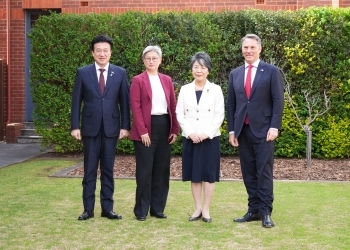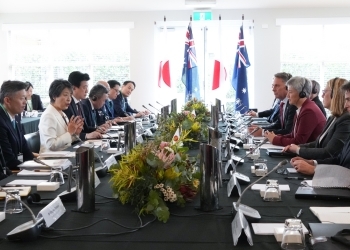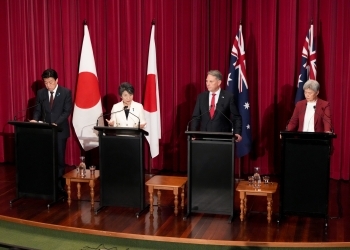Japan-Australia Relations
Eleventh Japan-Australia 2+2 Foreign and Defence Ministerial Consultations (“2+2”)



On September 5, commencing at 11:20 a.m. local time (10:20 a.m. JST) for approximately 2 hours, Ms. KAMIKAWA Yoko, Minister for Foreign Affairs of Japan, and Mr. KIHARA Minoru, Minister of Defence of Japan, held the eleventh Japan-Australia 2+2 Foreign and Defence Ministerial Meeting with the Hon. Richard Marles MP, Deputy Prime Minister and Minister for Defence of the Commonwealth of Australia and Senator the Hon. Penny Wong, Minister for Foreign Affairs of the Commonwealth of Australia in Melbourne, Australia. The overview of the meeting is as follows. A Joint Statement was issued after the consultations.
1. Overview
At the outset, Minister Kamikawa stated that, Australia, with which Japan is working together to realize a “free and open Indo-Pacific,” is now indispensable to Japan's security and that it is necessary to continue to unwaveringly strengthen security cooperation and elevate it to a new level. Minister Kihara stated that Australia and Japan fully share the same values and strategic objectives, and that the next phase of Japan-Australia cooperation will be to establish a posture for effective coordination between the JSDF and the Australian Defence Forces in all situations, from peacetime to contingencies, and to work with the United States to strengthen practical deterrence and response capabilities
2. Security Environment in the Indo-Pacific Region
Japan and Australia had a candid exchange of views on the security environment in the Indo-Pacific region and concurred on deepening shared strategic recognition. They concurred on playing a leading role in realizing a free and open Indo-Pacific.
- They reaffirmed their strong opposition to any unilateral actions that seek to change the status quo by force or coercion in the East and South China Seas. They discussed with serious concern the recent activities by Chinese military assets in Japanese territory. In the South China Sea, they expressed serious concern over the recent developments, including China's intensification of dangerous and coercive activities, and opposed any coercive actions that could escalate tensions and undermine regional stability. They underscored the importance of peace and stability across the Taiwan Strait.
- They affirmed their cooperation in dealing with North Korea, including its nuclear and missile activities, the advancement of military cooperation between North Korea and Russia, and the abductions issue.
- Regarding Southeast Asian countries and Pacific Island countries, they concurred on working together to ensure stability and prosperity in the region, taking into account changes in the strategic environment and the priorities of each country.
3. Security Cooperation
- Overview
Japan and Australia concurred on working unwaveringly to deepen Australia-Japan strategic and security cooperation and, including all tools of statecraft, in line with the Australia-Japan Joint Declaration on Security Cooperation (JDSC), issued in 2022. Japan and Australia concurred on strengthening collective deterrence, enhancing interoperability and coordinating their national security policies more closely, including in cooperation with the United States. - Strengthening Special Partnerships
Japan and Australia concurred on strengthening cooperation in the field of economic security, including through leveraging the Australia-Japan Economic Security Dialogue.
Japan and Australia concurred on strengthening discussions on strategic infrastructure cooperation. They also affirmed their intention to activate Australia-Japan-US Trilateral Infrastructure Consultations (TIC).
Japan and Australia concurred on enhancing bilateral cooperation on strategic communications, narratives and countering foreign information manipulation, including through developing our joint understanding of the impact of foreign state information manipulation, and discussing ways to support civil society, media and academia to build societal resilience.
Japan and Australia concurred on enhancing cybersecurity cooperation through the Cyber Policy Dialogue, deepening dialogue between our foreign ministries’ chief information officers, and strengthening information security cooperation, including deepening discussions on classified information sharing.
In addition, Japan and Australia concurred on strengthening cooperation in the evacuation of respective nationals from third countries during crises, noting recent successful collaboration in New Caledonia.
Minister Kamikawa also pointed out the importance of cooperation towards the full implementation of the WPS and shared that she has been raising WPS at various opportunities, including at the TICAD Ministerial Meeting.
In response, Foreign Minister Wong expressed her respect for Minister Kamikawa's leadership. - Cooperation in the Indo-Pacific to promote security, connectivity and prosperity
Japan and Australia concurred on collaborating on initiatives for security and stability in the Pacific region, including maritime cooperation with Southeast Asian countries and Japan's Official Security Assistance (OSA).
Japan and Australia concurred on working together to strengthen the connectivity and digital resilience of the Pacific by establishing an Australia-Japan Pacific Digital Development Initiative (PDDI). They also affirmed their commitment to collaborating on undersea cables in the region. - Operational Cooperation and Joint Training, Advanced Capability and Technology Cooperation
Japan and Australia concurred on reaffirming the importance of, and further refining, the Scope, Objectives and Forms (SOF). Japan and Australia concurred on enhancing bilateral operational capabilities and interoperability through operations and joint exercises, leveraging the Australia-Japan Reciprocal Access Agreement (RAA). With the future establishment of Japan Joint Operations Command (JJOC), they also welcomed reciprocal exchanges of liaison officers between our joint headquarters.
Japan and Australia concurred on further cooperation between counter strike capabilities that leverage Japan’s stand-off defense capability and Australia’s long-range strike capability.
In addition, Japan and Australia concurred on cooperating on enhancing information warfare capabilities. They also agreed to cooperate in the area of technology. Furthermore, they concurred on continuing to consult with AUKUS partners and Japan on opportunities for cooperation on AUKUS Pillar II Projects. - Japan-U.S.-Australia cooperation, Indo-Pacific Defense Security Cooperation
Japan and Australia welcomed Australian defense personnel’s participation in the Japan-United States Bilateral Information Analysis Cell (BIAC) and affirmed expanding trilateral intelligence, surveillance, and reconnaissance (ISR) cooperation.
Japan and Australia reaffirmed that Japan and Australia will enhance air cooperation, including reciprocal deployments of United States, Japanese, and Australian F-35s, and cooperation on networked air and missile defense architecture, as well as increasing Japan’s participation in activities enabled by Australia-United States force posture cooperation.
In addition, Japan and Australia affirmed that Japan and Australia will enhance cooperation among the U.S., Australia, India, and Japan, as well as with the Philippines, Pacific Island countries, South Korea, and others.
(Reference) Eleventh Australia-Japan 2+2 Foreign and Defence Ministerial Consultations
(English (PDF) / Japanese (PDF)
/ Japanese (PDF) )
)

